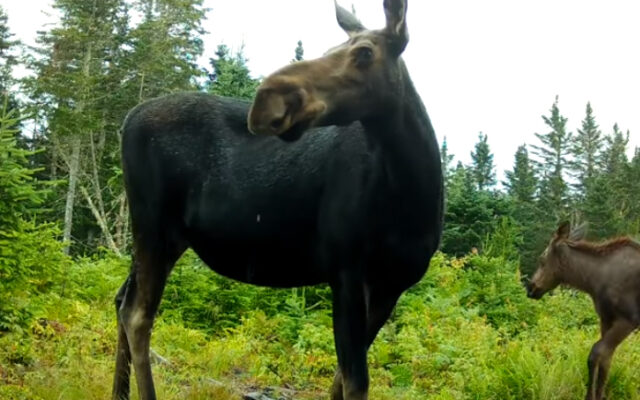
More moose calves should make it through the winter
By Julie Harris, Bangor Daily News Staff
The number of ticks on the moose killed during the annual hunt this fall are down quite a bit for the second year, according to Maine’s moose biologist.
Lower tick loads mean a higher survival rate for Maine’s moose calves, said Lee Kantar, moose biologist in the Maine Department of Inland Fisheries and Wildlife.
Sixty calves of the 70 being monitored died from moose ticks in the 2021-22 season, which was Maine’s deadliest year. But only two of the 70 calves collared in the 2022-23 season died.
Kantar is part of a team of scientists and others who will put monitoring collars on 70 calves in early January to continue the tick study. Maine biologists work with their Canadian counterparts in Quebec to study moose health.
This is the 11th year the scientists have collared moose to study them. They have collared close to 900 moose, Kantar said.
“Moose go back and forth across the border. Quebec’s regional biologist will collect a collar or do a necropsy if a moose we’re monitoring loses its collar or dies on the Canadian side,” he said.
The final data for the 2023 moose hunt won’t be available until early in 2024, but Kantar said the number killed will be similar to last year’s. The state’s Big Game Harvest Dashboard shows 2,454 moose, but the number is not final.
A total of 4,106 permits were issued in 2023 for the three separate weeks of moose hunting — two for bulls and one for cows — plus adaptive hunting days. With that number of permits issued, it makes Maine’s moose hunt one of the biggest in the lower 48 states, Kantar said.
Maine manages the moose herd as a renewable resource for future generations and conservation, which means it will be sustainable. The annual hunt is part of the management strategy, he said.
The moose hunt has changed in the last few years. Moose have learned that people shoot at them if they are in the roads, which means that hunters who ride on logging roads and expect to shoot a moose will likely be disappointed. The moose are found deeper in the woods, Kantar said.
Maine’s hunt is unique in that hunters have basically one week to scout out an area and kill a moose, unlike deer season in which there are several weeks from bow hunting to muzzleloader to figure out the deer’s patterns, he said.
The annual moose hunt attracts people who hunt together almost every year because at least one person in the group has a permit. But there are also people who have never hunted before, Kantar said.
They may see lots of moose and choose not to shoot any of them because they are looking for a specific antler spread or animal size and go home empty-handed. Or they may shoot the first one that fills their tag.
“A successful hunt is measured in other ways than just filling that tag,” he said, citing a father and son who had a great time hunting together for a week and another hunter who saw several moose all week and chose not to shoot one.